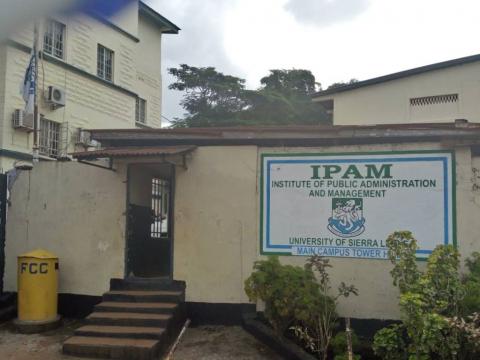By Mohamed Jaward Nyallay
Parliament has ratified a US$50million agreement between the developer, Femab Properties Limited and the Institute of Public Administration and Management (IPAM).
The approval on Tuesday paves the way for the construction of an ultra-modern campus at Bureh Town which will address a growing problem of accommodation for students of the college.
According to the terms of the agreement, Femab will contribute 75% of the resources whiles IPAM will contribute the remaining 25%. After construction, IPAM will pay the debt in installments over six years. The timeline for the construction is three years.
IPAM, which is one of the three constituent colleges of the University of Sierra Leone, was established in 1980 and is today the leading institution in the country in delivering management, business and administration courses. The population of the college has grown drastically over the last decades. The college’s administrators say they have more than 5000 students at its current main campus at AJ Momoh Street in Freetown.
Last year, the college completed the construction of a seven-story building at the main campus. In spite of that, accommodation for lectures remains a major problem.
Several students of the college were at Parliament on Tuesday when lawmakers debated the agreement. Student Union President, Alpha Kabba, said they will advocate for more facilities at the Bureh campus.
“As a student one of the things that we always want to see is learning accommodation. At IPAM we are constraint with so much facilities. Now, it is difficult for us to get water on campus because of the hill. This is one of the things we will advocate for,” he told after lawmakers approved the agreement.
“We also need worship centers on campus; mosques and churches,” he added.
According to the plan layout for the proposed campus which spans over 70 acres of land, it will entail a hostel, recreational facilities, an international conference center, among others.
Lawmakers from across party divides were unanimous in praises for the agreement.
Hon. Abdul Kargbo from the opposition All Peoples Congress said: “Education is very important. IPAM is a necessity in Sierra Leone. I advise we ratify this document with expediency.”
Hon. Sahr Matthew Nyuma, a Member of the ruling Sierra Leone Peoples Party, also praised the agreement.
“We are happy for this. If you go to IPAM now, it is really congested,” he said.
As part of the agreement in the contract, IPAM will have to pay US$1.8 million every quarter. If they default on the payment, they will have to pay 1% extra on the same sum. Despite support from parliamentarians, there were also concerns, particular over the potential for defaulting in the quarterly repayment plan.
MP Nyuma cited the likelihood of the IPAM authorities to default in the payment of the loan “because the penalty is small.”
The Financial Consultant of the project, who is also a lecturer at the college, Dr Ezekiel Duramany Lakkoh, assured that the college will be able to meet the terms of payment of the loan. Lakkoh told Politico that they have done proper self assessment to ascertain the college’s ability to service the loan.
“What we did for the past year is we’ve looked at our cash flow and looked at our ability to pay. So, the ability to pay is such that we have a very conservative budget and it is off the books of government. And from what we demonstrated with the building of the seven-story building, all what we need to do is a structured financial management regime that will be able to address excessive spending and save enough for us to meet it,” he said outside the Well.
Deputy Minister of Finance, Dr Patricia Laverley, who presented the agreement to parliament, also expressed optimism on the payment plan.
“We are confident about the cash flow projections, as anticipated by the student population explosion,” she told lawmakers while presenting the document in the Well.
This was not the only concern that was raised; Hon. Abdul Latif, another APC Member, raised a concern over the possible impact the cost of the project might have on tuition fees.
“It is a laudable venture to harmonize the campus, so they wont have campuses scattered around. But IPAM should ensure [that] the cost of the contract should not impact the cost of education,” Latif said during the debate session.
In response to this, Dr Lakkoh told Politico that the payment projections were in line with the current rate of fees.
“That’s the interesting thing about this project. It has nothing to do with student fees. All our projections had to do with current fees and not even government subsidy. We are looking at current fees trend and a manageable size of students as against the cash flow out lay,” he said.
IPAM’s calculation is also based on the high enrollment of children in schools across the country, as a result of the government’s free quality education program. By the next decade, it is expected that there will be a huge demand for tertiary education by these children who are enrolling now.
To tap in to this ‘student population explosion’, Lakkoh said the college could expand online to enroll as much as 25,000 students.
“The rate of student population explosion is very alarming. If we even undertake other programs online, we might have 25,000 students in five years,” he said.
“We will have the capacity. There are colleges that have as much as 45,000 students,” he added.
With this agreement, the mobilization of resources for the project will commence.
“So, we are going to administrative process now to access the finance. We will immediately start with the financing procedure and after that, the mobilization of funds,” Dr Lakkoh said.
Early this year, the government and officials of the college turned the sod at the proposed construction site in a symbolic ceremony at Bureh in the Western Rural Area.
© 2019 Politico Online









